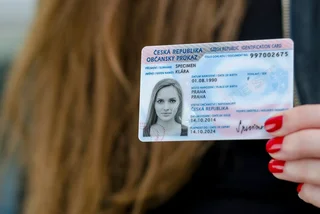Fallen tree kills two during heavy storms in South Bohemia
Storms and heavy rain raised several rivers in the Czech Republic to flood levels. The situation is currently most serious in the east of the Pilsen Region on the streams in the Úslava and Klabava river basins, where there is an extreme risk of flooding. Due to Thursday night's storm, around 33,000 households are without electricity. Extreme weather also claimed the lives of two people whose car was struck by a falling tree. The accident led to the death of a man and a woman in the front seat of their vehicle, in the town of Čížová near Písek Thursday night. Two children who were also reportedly in the car suffered injuries and were transported to the hospital in Písek. The couple who lost their lives in the accident had offered shelter to the children in their car. The heavy storm felled several trees and complicated traffic on a number of roads in South Bohemia. ČTK
President signs bill on female surnames into law
All Czech women may officially register their surname in its masculine form under a bill signed into law by Czech President Miloš Zeman Thursday, a spokesperson from Prague Castle told ČTK. Under the new legislation, women can register their surname without the -ova suffix. At present, the registration of the surname without the -ova ending is only possible for foreign women, Czech women with permanent residence abroad, Czech women married to foreigners, and women who are Czech citizens but with other than Czech ethnicity. The option of registering a masculine surname for women is part of a series of changes related to the new law on ID cards. Under the law, new ID cards embedded with chips containing the holder's fingerprints can be issued in the Czech Republic. The law on new personal ID cards takes effect on August 2. The bill ends the practice of storing selected data on ID cards, such as the holder's academic title or personal identification number. ČTK
Czech PM won't join EU leaders' call to support sexual minorities
Czech PM Andrej Babiš (ANO) is unlikely to join a June letter signed by 17 EU leaders in support of sexual minorities and provoked by a Hungarian law banning the spread of any material depicting homosexuality and transgender among minors under 18. The PM accused the opposition Pirates, who asked him why he won't be among the letter's signatories, of betrayal and disintegration of the Czech Republic per order from Brussels. Babiš said that both the Czech Republic and Hungary are sovereign countries and that he didn't want to meddle in Hungarian law. "Parents and not some non-profit organization should raise children," he said, adding that he has no problems with homosexuals and has a number of gay friends. On June 22, more than half of the EU countries called on the European Commission to intervene against the new Hungarian law. A day later, EC President Ursula von der Leyen called the legislation shameful and announced that the EC would try to make Hungary change it.
Czech Railways launches sales of bus tickets from Prague to the sea
For the first time, Czech Railways has merged with a bus carrier for commercial connections to the sea, according to the Zdopravy.cz server. Czech Railways began cooperation this week with the bus carrier Vega Tour selling bus tickets in its reservation system to seaside destinations with a transfer in Prague. Vega Tour also announced the news on its Facebook profile. The bus lines travel to the Adriatic Sea to Croatia and Italy and leave the Czech Republic every Friday and with a Saturday return. Prices from Prague range from 1020 to 1290 CZK for a one-way ticket.
EU housing prices rise at fastest rate since 2007
EU housing prices rose at the fastest pace in nearly 14 years in the first three months of this year. Values were driven by low-interest rates and high household savings despite the historic economic damage caused by the coronavirus pandemic. Housing prices across the union grew at an annual pace of 6.1 percent in the first quarter, up from 5.8 percent in the previous three months and the fastest pace since the third quarter of 2007, according to data published by Eurostat on Thursday. Germany reported the fastest increase in prices among the EU’s big economies at 9.4 percent; countries including Denmark, the Czech Republic, and the Netherlands logged double-digit annual price growth. In the Czech Republic, prices were recorded as growing by 3.1 percent. In contrast, property price growth in Spain slowed to 0.9 percent, down from a decade high of 7 percent in the third quarter of 2018.
Highest house #price increases in Q1 2021 compared with 2010:
— EU_Eurostat (@EU_Eurostat) July 8, 2021
🇪🇪 Estonia (+126.8%) and
🇱🇺 Luxembourg (+108.2%)
Highest #rent increases:
🇪🇪 Estonia (+140.4%) and
🇱🇹 Lithuania (+108.6%)
👉 https://t.co/fBt9kUelU3 pic.twitter.com/fWOhbCYSRY












 Reading time: 3 minutes
Reading time: 3 minutes 




 English
(Advanced)
English
(Advanced)





















